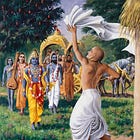The donkeyness of materialistic life
Modern life makes us just like the donkey, working hard to eat his morsel of food and his cup of coffee, not understanding that being free, he could eat as much as he wanted.
Prabhupada often compared materialists to donkeys. The characteristic of the donkey is that it can be made to work very hard for just a morsel of grass. Grass grows everywhere. If the donkey were to become free from his master, he could eat as much as he wanted, but because he can't understand that, he remains in captivity, working hard to get his daily morsel.
This example is becoming more relevant than ever. We may not notice that, but the whole materialist lifestyle is based on creating artificial scarcity and thus making people work very hard, forgetting all higher goals in life. The whole concept of a capitalist society is based on creating unlimited needs and possibilities, so whatever one makes is never enough. People are thus made to work to exhaustion, feeding the growth of the economy. The purpose of the system is not to create well-being or any positive outcome, but simply to create economic growth year after year, in the form of a cold increase in GDP, regardless of such growth being useful or not.
One example of how the system works is food. In most large cities, and especially in places like airports, food can be extremely expensive. Often people pay 10 euros for a sandwich. Wheat flour is sold for cents per kilo; one can bake his own bread and eat as much as one wants, but in the name of commodity, one is restricted. Now, instead of just eating freely, one has to work hard for just a small morsel of food.
It may sound insane for many, but millions of people pay seven dollars or more every day for a cup of coffee at Starbucks or similar chains. Becoming addicted to coffee is a problem in itself, but it becomes worse when someone becomes addicted to coffee in such an expensive form. People get used to thinking that without their daily coffee, they can't work. Apart from the coffee, they spend money on fast food (since they are so busy with work that they don't have time to cook), expensive clothes, cars, and other symbols of status, to reinforce their social position, and so on. In the end, work becomes an end in itself; we work just to maintain the whole lifestyle one needs to maintain to keep working. We live in constant scarcity, without time for cultivating meaningful relationships or having any higher goal in life. We then question why we struggle to chant our rounds.
We may not realize it, but this lifestyle makes us just like the donkey, working hard to eat his morsel of food and his cup of coffee, not understanding that being free, he could eat as much as he wanted. The material world is not necessarily a bad place to be. It is temporary, undoubtedly, but it can be a place of transition to something eternal. One can live happily with one's family, living in a simple lifestyle and practicing Krsna Consciousness, but we make it into a place of suffering by nourishing our materialistic desires.
In the Gītā, this desire of enjoying materially is defined as lust, which is explained as having two characteristics: never being satisfied, and burning like fire. No one can be satisfied while being burned inside a fire. All our attempts to make our position in life a little more comfortable are just palliative measures. After having one side burned, one may feel a little relieved in turning to the other side, but very soon it starts burning also. The solution is to extinguish the fire, and not try to find a way to be comfortable inside of it. The only solution is to simplify our lives, so we can have time and peace of mind to practice Krsna Consciousness, finding the higher taste that is the definitive solution for burning material desires and hellish materialistic life.
Prabhupada summarized this whole concept in his simple living, high thinking motto. We may not be able to move to the land and grow our own vegetables as he originally envisioned, but we can at least simplify our lives, avoiding the main traps of capitalism and regaining our freedom.
Once we stop buying so many products and services and learn to do things ourselves, we realize we can do much more with much less money. Suddenly, we don't need to work so hard just to maintain the status quo. We regain our freedom, and using this freedom to invest time in our spiritual practice, we find true happiness.
If you read this article to the end, give it a like or write a commentary. This makes Substack recommend it to more people.
Read also:






Hare Krishna Prabhu ji 🙏 this is so true and I have experienced all these things you have mentioned. We rented a home but our lifestyle is such we spend whole day at work and comes at night just to sleep and again goes for work . Thank you prabhu ji 🙏